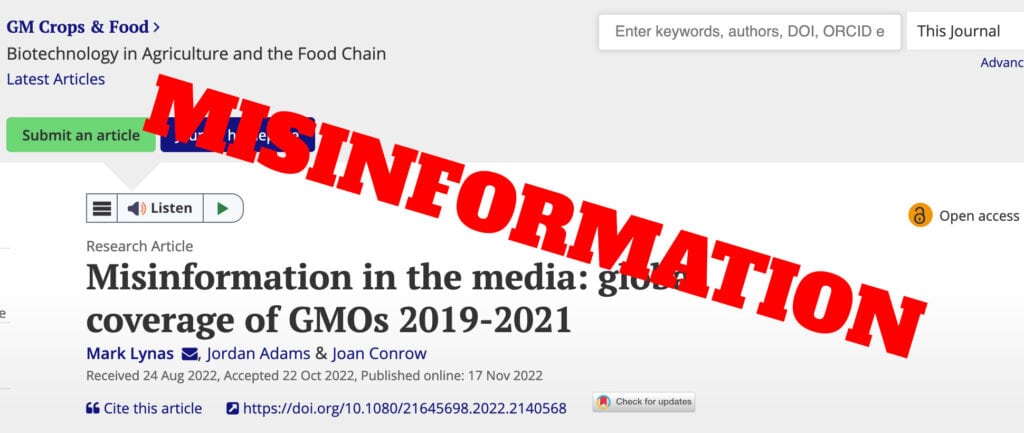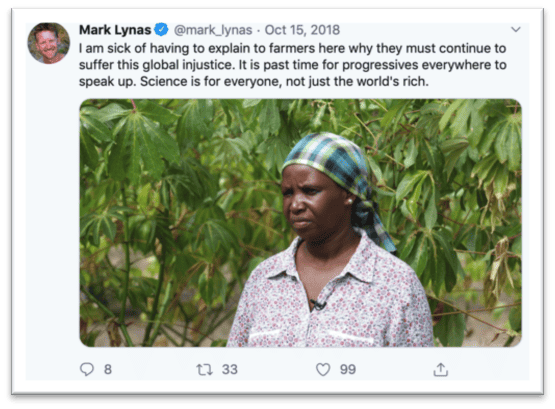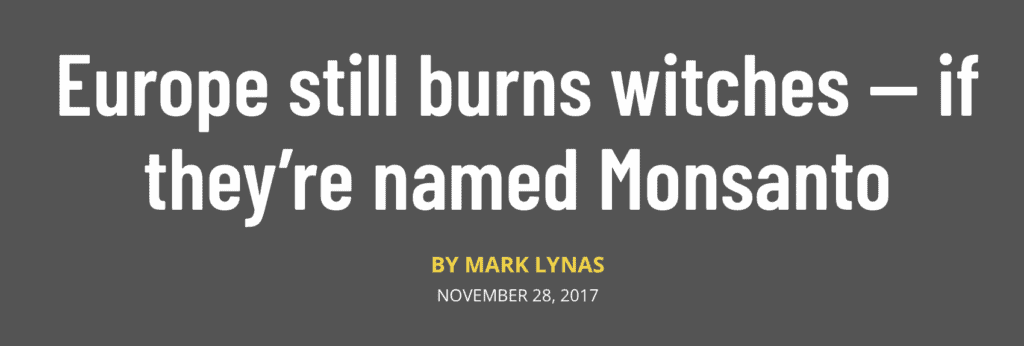Mark Lynas is a former journalist turned public relations advocate for genetically engineered foods and pesticides. He makes inaccurate claims about those products from his perch at the Gates Foundation-funded Cornell Alliance for Science (which has dropped “Cornell” from its name). The Alliance for Science is a PR campaign that trains spokespeople and creates networks of influence, particularly in African countries, to persuade the public and policymakers to accept GMOs and pesticides.
Scientists, food experts say Lynas is wrong on science
Scientists, food policy experts and African groups have written lengthy critiques of Lynas’ work, documenting inaccuracies, misleading statements and unethical tactics Lynas has used in his promotional work for GMOs and pesticides. Critiques and documentation include:
“critical flaws” in reporting – In a 2023 peer-reviewed critique, molecular geneticist Michael Antoniou et al. analyzed a Lynas co-authored paper that attempts to equate critics of agricultural GMOs and people who make false claims about climate change, COVID-19, and vaccines. Antoniou and co-authors found: “Lynas et al.’s publication suffers from critical flaws, such as an absence of scientific evidence to support the arguments presented; omission of relevant evidence on health and the environment; a reliance on spurious analogies; and a failure to distinguish ‘misinformation’ … In sum, it is evident that Lynas et al. resort to inaccurate and potentially libellous accusations, spurious analogies, selective and uncritical reporting, and misrepresentations of the state of the science on GM foods and crops and their associated pesticides, in an apparent attempt to promote and defend these products.”
- Agricultural GMOs and their associated pesticides: misinformation, science, and evidence, Antoniou et al., Environmental Sciences Europe, September 2023.
- Peer-reviewed critique: Mark Lynas’s article accusing GMO critics of spreading “misinformation” is itself misinformation, Jonathan Matthews, GM Watch, September 15, 2023.

Researchers concluded that Lynas and co-authors’ article on misinformation is itself misinformation.
Attacks on agro-ecology “an embarrassment” – Lynas claimed in a 2020 article that agro-ecological farming “risks harming the poor;” his article was widely panned by global development experts who described it as “an embarrassment” for someone who claims to be scientific, a “demagogic and non-scientific interpretation of a scientific paper” and a “flawed analysis” that offers “sweeping generalizations” and “wild conclusions.”
“contempt for the African people” – African groups have documented false statements and misleading tactics Lynas has used in his efforts to promote GMOs in Africa. The African Food Sovereignty Alliance, a network of 50 African groups, described Lynas as “patronizing” and said he promotes “false promises, misrepresentation, and alternative facts” in his GMO promotions. “The fly-in pundit’s contempt for African people, custom and tradition is unmistakeable,” they wrote. African groups have also documented how Lynas used false and misleading images of African farmers in his PR work for GMOs.
- Seeds of Neocolonialism: Why the GMO promoters get it so wrong about Africa, Statement by the Alliance for Food Sovereignty in Africa, May 7, 2018
- Mark Lynas slammed for exploiting African farmers’ images to promote GMOs, African Centre for Biodiversity press release, December 7, 2018
- Mark Lynas’ unauthorized use of farmer’s images in misleading and unethical tactics to promote GM crops in Tanzania, by Eugenio Tisselli, PhD, Angelika Hilbeck, PhD, 2018.
Many other experts have documented Lynas’ inaccurate statements:
- “I can unequivocally state that … most of (Lynas’) statements are false,” wrote David Schubert, PhD, Head, Cellular Neurobiology Laboratory, The Salk Institute
- “Instead of debating or discussing the actual science, Lynas casts aspersions and resorts to relying on authority rather than data or research,” wrote Doug Gurian-Sherman, PhD, former senior scientist, Union of Concerned Scientists.
- Lynas’s clams about GMOs are “unscientific, illogical and absurd,” wrote Belinda Martineau, PhD, a genetic engineer who helped develop the first GMO food (see also NYT letter).
- Lynas “issued this very dramatic, but essentially, fabricated reinvention of his own biography to springboard into a new phase of his career,” said James Wildson, professor of science policy at the University of Sheffield.
- Lynas’ book Seeds of Science is an “amateurish rehash of common industry talking points,” wrote Glenn Davis Stone, an environmental anthropologist at Washington University in St. Louis.
- “The laundry list of what Mark Lynas got wrong about both GMOs and science is extensive, and has been refuted point by point by some of the world’s leading agroecologists and biologists,” wrote Eric Holt-Giménez, PhD, former director of Food First.
- Mark Lynas has “made a career out of … demonization, ” wrote Timothy A. Wise, former director of research, Global Development and Environment Institute, Tufts University.
- “Mark Lynas’ claims display deep scientific ignorance, or an active effort to manufacture doubt. You should ignore him,” tweeted Pete Myers, PhD, chief scientist at Environmental Health Sciences.
‘Manipulative, misleading and unethical’ tactics
Africa-based groups say Lynas has repeatedly misrepresented facts to promote a political agenda. A December 2018 report documents how Lynas and Cornell Alliance for Science used images of African farmers without their knowledge and consent, and in misleading ways to claim farmers need GMOs.

Lynas posted the above image of a Tanzanian farmer, Mrs. R, without permission and out of context, suggesting she is a victim of “global injustice.” Mrs. R is in fact a successful farmer who champions agroecological practices and makes a good living, according to the report. She asked Lynas to remove her image, but it remains on his Twitter feed. Lynas’ tactics “crossed an ethical red line and must cease,” according to the report posted by the African Centre for Biodiversity.
The seed sovereignty group said in a press release that Lynas has a “history of mischief-making in Tanzania” for the agricultural biotech industry lobby. “His visits to the country are well organized by the lobby, using platforms such as the regular meetings of the Open Forum on Agricultural Biotechnology in Africa (OFAB), where the media are in attendance to report on his talks. His attacks have principally been directed at the country’s biosafety regulations, particularly its precautionary approach and strict liability provisions.”
Pesticide industry talking points, not science
Another example of inaccurate reporting by Lynas is his 2017 article for the Cornell Alliance for Science attacking the World Health Organization’s cancer agency for reporting glyphosate is a probable human carcinogen. Lynas claimed the expert panel report was a “witch hunt” and an “obvious perversion of both science and natural justice,” orchestrated by people overcome with “hysteria and emotion.” He claimed glyphosate is the “most benign chemical in world farming.”
A fact check by U.S. Right to Know found that Lynas made misleading and erroneous arguments and relied on two flawed sources, including a former chemical industry lobbyist.
In his defense of Monsanto, Lynas also failed to report on the substantial documentary evidence, widely reported in the media, that Monsanto manipulated the science and regulatory reviews on glyphosate for decades using covert tactics including ghostwriting studies and articles, trying to stop independent research, pushing dubious science, attacking scientists and strong-arming regulatory agencies in order to protect its profits.

Promoted by, tied to pesticide industry PR network
Pesticide companies and their PR operatives frequently promote Lynas and his work. See for example Monsanto’s website, many promotional tweets by pesticide industry trade groups, lobby groups, industry-paid academics and writers, and various Monsanto employees. Dozens of Lynas’ articles are promoted by the Genetic Literacy Project, a propaganda group that receives funds from Bayer.
Advises Monsanto partner group Sense About Science
A confidential Monsanto PR plan dated February 2015 identified Sense About Science as a group that could help lead the industry’s media response to discredit the WHO cancer report about glyphosate. Lynas serves on the advisory council of Sense About Science. The group “does not always disclose when its sources on controversial matters are scientists with ties to the industries under examination” and “is known to take positions that buck scientific consensus or dismiss emerging evidence of harm,” according to reporting in The Intercept. Sense About Science also partnered with the Cornell Alliance for Science to offer “statistical consultation for journalists” via the group’s director Trevor Butterworth, whom journalists have described as a “chemical industry public relations writer.”
Launched pro-fracking/nuke/GMO “ecomodernism movement”
Lynas calls himself a co-founder of the “movement” of “ecomodernism,” a corporate-aligned strain of “environmentalism” that promotes fracking, nuclear power, GMOs, and ultra-processed foods as ecological solutions. According to eco-modernist leaders Ted Nordhaus and Michael Shellenberger of the Breakthrough Institute, energy technologies favored by the oil billionaire Koch brothers “are doing far more to reduce greenhouse gas emissions than the ones favored by the climate-apocalyptic Left.”
At a failed launch event for ecomodernism in September 2015, Lynas aligned himself with Owen Paterson, a prominent climate science denialist who slashed funding in the UK for global warming when he was secretary of the environment. The same month Paterson spoke at Cornell Alliance for Science, where he promoted GMOs in a hyperbolic speech filled with unsupportable claims, and accused environmentalists of allowing children to die in Africa. “Billion dollar green campaigns kill poor children,” touted a headline promoting Paterson’s speech from the American Council on Science and Health, a front group Monsanto was paying to defend its products.
Mark Lynas background
Lynas authored several books on climate change (one of which was recognized by the Royal Society) before he attracted worldwide attention with his “conversion” from an anti-GMO activist to an avid promoter of the technology, with a widely-promoted 2013 speech at Oxford that experts said contained many falsehoods. Later that year Lynas became a fellow at Cornell University Office of International Programs at the College of Agriculture and Life Sciences, and began working for the Gates Foundation-funded Cornell Alliance for Science, a communications campaign developed in 2014 to promote GMOs.
See our reporting: Why is Cornell University hosting a GMO propaganda campaign?
Lynas identified himself as the “political director” for Cornell Alliance for Science in a 2015 New York Times op-ed. The Alliance for Science does not explain what its political agenda is, but the group’s messaging and goals closely track the agrichemical industry’s commercial agenda: to increase acceptance of genetically engineered crops and pesticides around the world, particularly in Africa.
Mysterious Lynas PR push, and leaked EuropaBio memo
The massive media coverage of Lynas’ pro-GMO conversion in 2013 raised suspicions that an industry PR campaign was helping to elevate him behind the scenes. A leaked 2011 memo from an industry PR firm that specifically named Lynas – and described plans to recruit high profile “ambassadors” to lobby for GMOs – heightened suspicions of industry backing. Lynas has said the group never approached him.
According to a Guardian report, EuropaBio, a trade group whose members include Monsanto and Bayer, planned to recruit PR ambassadors to help decision makers “rethink Europe’s position on GM crops.” The ambassadors would not be paid directly but would receive travel expenses and “dedicated communications support” from industry funding. The PR firm’s operative rep claimed to “have interest from” Lynas, mong others, in the ambassador role. Lynas denied having any contact with them. “I have not been asked to be an ambassador, nor would I accept such a request if asked,” he told the Guardian.
Gates Foundation, GMOs & Monsanto
The Bill & Melinda Gates Foundation, the principal funder for the Cornell Alliance for Science, has been widely criticized for agricultural development funding strategies that favor corporate agribusiness agendas. A 2014 analysis and a 2021 follow-up report from the research group GRAIN documents that the Gates Foundation spends most of its agricultural development funds ostensibly devoted “to feed the poor in Africa” to fund scientists and researchers in wealthy Northern nations. The money also helps buy political influence across Africa, GRAIN reported. A 2016 report by the advocacy group Global Justice Now concluded that the Gates Foundation’s agricultural development strategies are “exacerbating global inequality and entrenching corporate power globally.”
See our reporting on the Gates Foundation’s agricultural interventions in Africa.
The Gates Foundation massively expanded its funding for agricultural projects in 2006 when Rob Horsch, Monsanto’s former head of international development joined the Gates Foundation’s agricultural development leadership team. Lynas’ book “Seeds of Science” includes a chapter titled, “The True History of Monsanto,” in which he defends Monsanto and lauds Horsch. In a chapter titled, “Africa: Let Them Eat Organic Baby Corn,” Lynas argues that Africans need pesticide industry products to feed themselves.
Critiques of the Gates Foundation agricultural development work
- The New Colonialist Food Economy: How Bill Gates and agribusiness giants are throttling small farmers in Africa and the Global South, by Alexander Zaitchik, The Nation 9/18/23
- Rich Philanthropists Don’t Have the Solutions to Africa’s Hunger Crisis, by Jan Urhahn, Jacobin, 9/2023
- How the Green Revolution Is Harming Africa, by Jayati Ghosh, Project Syndicate, 10/14/20
- Seeds of Neo-Colonialism: Why the GMO Promoters Get it So Wrong About Africa, statement by the Alliance for Food Sovereignty in Africa, 5/7/2018
- Are Gates and Rockefeller using their influence to set agenda in poor states? “Study identifies Bill and Melinda Gates and Rockefeller foundations among rich donors that are close to government and may be skewing priorities,” by John Vidal, the Guardian, 1/15/2016
- Philanthropic Power and Development. Who shapes the agenda? by Jens Martens and Karolin Seitz, 2015 report (page 48).
- Philanthrocapitalism: The Gates Foundation’s African programs are not charity, by Philip L Bereano, Professor Emeritus at the University of Washington, Third World Resurgence, 2017
- How Bill Gates is Helping KFC Take Over Africa, by Alex Park, Mother Jones, 1/10/2014
- Gates Foundation’s Seed Agenda in Africa ‘Another Form of Colonialism, ‘ Warns Protesters, by Lauren McCauley, Common Dreams, 3/23/2015
- Gates Foundation is spearheading neoliberal plunder of African agriculture, by Colin Todhunter, The Ecologist, 1/21/2016
- How does the Gates Foundation spend its money to feed the world? GRAIN report, 2014
- Bill Gates is on a mission to sell GMOs to Africa, but he’s not telling the whole truth, by Stacy Malkan, Alternet, 3/24/2016
- Read more of our reporting about Bill Gates and his food and agricultural agenda.









